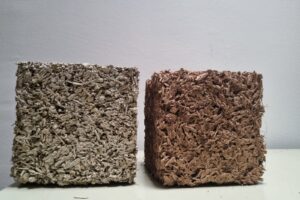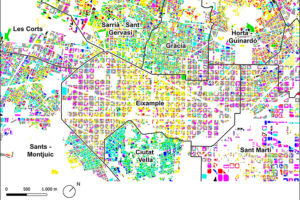
INDUSAC: Conclusion of a Pioneering Model for Industry–Academia Collaboration
September 29, 2025
INVISITAGS: Integrated labels for the traceability of textile garments
October 7, 202502/10/2025
The company Friselva S.A., Corporació Alimentària Guissona (bonÀrea), together with the Food Service Cluster and inLab FIB at the Universitat Politècnica de Catalunya - BarcelonaTech (UPC), are participating in the Hydroless project, which aims to optimise water consumption in meat production plants. The project includes an innovative solution to monitor and optimise water use at bonÀrea’s plant in Guissona, as well as the design and development of a digital twin of Friselva’s facilities in Riudellots de la Selva.
The current situation of the meat industry is characterised by several challenges, including pressure on water resources and the need to improve environmental sustainability. Meat processing facilities show a very high water consumption, required in different stages of the process such as meat washing, cooling, and other operations.
To address this challenge, the project sets out two main objectives. On the one hand, a solution will be developed to monitor and optimise the water consumption used during the production process at bonÀrea’s plant in Guissona. On the other hand, a digital twin of a subsystem of Friselva’s facilities in Riudellots de la Selva will be designed and developed as a proof of concept of the advantages of having a digital twin. The digital twin will allow the control of a virtual replica of the study area and the monitoring of (virtual) water consumption in order to explore design alternatives, such as specific water recirculation or configurations adapted to a specific production plan, thus optimising the water consumption of the real plant.
Budget and Funding
The project is funded within the framework of the Strategic Plan of the CAP 2023-2027 of the Government of Catalonia, with a total budget of €115,000. It has a duration of 18 months (December 2024 – May 2026).
Action of the Strategic Plan of the CAP 2023-2027 co-funded by:

Technology
You want to know more?
Related Projects
- The La Volta project foresees the construction of a large Catalan vault pergola within the Llars Mundet campus, in the Montbau neighbourhood (Horta-Guinardó district). This structure will become a new architectural landmark for Barcelona, combining traditional construction techniques with contemporary innovation. The project involves the Rehabilitation and Architectural Restoration Research Group (REARQ), at the Universitat Politècnica de Catalunya - BarcelonaTech (UPC), and is led by the Architects’ Association of Catalonia (COAC) and the Barcelona Provincial Council.
SATE-VEG: A system for energy renovation of buildings that helps reduce the urban heat island effect
Researchers from the Architecture, Energy and Environment (AiEM) group at the Universitat Politècnica de Catalunya - BarcelonaTech (UPC) have developed SATE-VEG, an external thermal insulation system with a vegetal coating that offers seasonally adaptive thermal behaviour, enhances urban biodiversity and promotes positive health effects. The system is made from organic materials, requires low maintenance and consumes minimal water.- A research team from the Interdisciplinary Group on Building Science and Technology (GICITED) at the Universitat Politècnica de Catalunya – BarcelonaTech (UPC) is leading the BioSAFE project, which aims to develop sustainable building envelopes —mainly façades— designed according to sustainability, comfort and safety criteria, with particular attention to their acoustic behaviour and fire performance.
- The Architecture, Energy and Environment (AiEM) research group at the Universitat Politècnica de Catalunya - BarcelonaTech (UPC) has characterised Barcelona’s residential buildings according to their capacity to adapt to climate change. This study is part of the project ‘VeUvE: Urban havens for vulnerable zones’. The work highlights the climate inequality conditions present across different areas of the city and will help to better define the priorities and energy renovation strategies for its districts.




